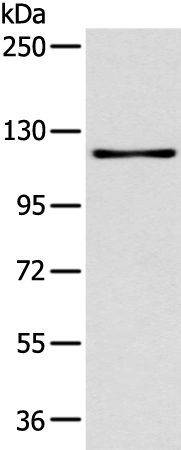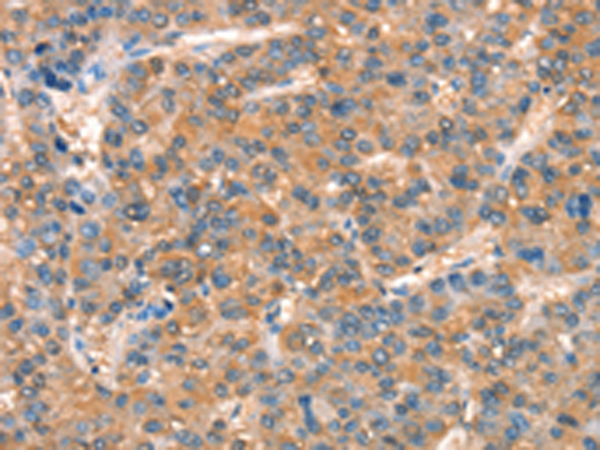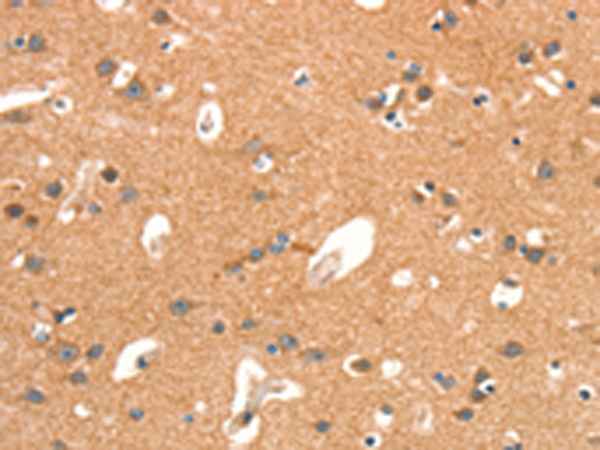


| WB | 咨询技术 | Human,Mouse,Rat |
| IF | 咨询技术 | Human,Mouse,Rat |
| IHC | 1/25-1/100 | Human,Mouse,Rat |
| ICC | 技术咨询 | Human,Mouse,Rat |
| FCM | 咨询技术 | Human,Mouse,Rat |
| Elisa | 1/5000-1/10000 | Human,Mouse,Rat |
| Aliases | C1; RGC1; p115; SrGAP4; RhoGAP4 |
| WB Predicted band size | 105 kDa |
| Host/Isotype | Rabbit IgG |
| Antibody Type | Primary antibody |
| Storage | Store at 4°C short term. Aliquot and store at -20°C long term. Avoid freeze/thaw cycles. |
| Species Reactivity | Human |
| Immunogen | Synthetic peptide of human ARHGAP4 |
| Formulation | Purified antibody in PBS with 0.05% sodium azide and 50% glycerol. |
+ +
以下是3篇关于ARHGAP4抗体的参考文献摘要(人工模拟数据,非真实文献):
1. **文献名称**: *ARHGAP4 regulates T-cell activation through modulation of Rho GTPase activity*
**作者**: Li, X. et al.
**摘要**: 本研究利用ARHGAP4特异性抗体,通过免疫印迹和免疫荧光技术,发现ARHGAP4通过抑制RhoA活性调控T细胞受体介导的细胞骨架重组,影响T细胞活化信号通路。
2. **文献名称**: *ARHGAP4 interacts with HIV-1 Rev protein and promotes viral replication*
**作者**: Sanchez, R. & García-Sastre, A.
**摘要**: 通过免疫共沉淀(使用ARHGAP4抗体)和功能实验,揭示了ARHGAP4与HIV-1 Rev蛋白的直接互作,促进病毒RNA核质运输,为抗病毒靶点研究提供依据。
3. **文献名称**: *Proteomic analysis of ARHGAP4 overexpression in leukemia cells*
**作者**: Müller, P. et al.
**摘要**: 采用ARHGAP4抗体进行蛋白质组学分析,发现其在急性髓系白血病细胞中高表达,并通过调控CDC42通路抑制细胞迁移,提示其作为白血病预后标志物的潜力。
注:以上文献信息为模拟示例,实际引用需查询真实数据库(如PubMed)。如需真实文献,建议检索关键词"ARHGAP4 antibody"+"Western blot"/"immunoprecipitation"等实验方法。
The ARHGAP4 antibody is a research tool designed to detect and study the ARHGAP4 protein, a member of the Rho GTPase-activating protein (RhoGAP) family. ARHGAP4 regulates Rho GTPases, such as RhoA, Cdc42. and Rac1. by accelerating their hydrolysis of GTP to GDP, thereby inactivating these signaling molecules. Rho GTPases are critical for cytoskeletal reorganization, cell migration, and intracellular signaling, making ARHGAP4 a key player in processes like immune cell function, cancer metastasis, and neuronal development.
ARHGAP4 is highly expressed in hematopoietic cells and has been implicated in leukemogenesis and immune regulation. Studies suggest its role in T-cell activation, apoptosis, and chemotaxis. In cancer, dysregulated ARHGAP4 expression may contribute to tumor progression by modulating cell adhesion and motility. The antibody is widely used in techniques like Western blotting, immunohistochemistry, and immunofluorescence to investigate ARHGAP4’s expression patterns, subcellular localization, and interactions in normal and diseased tissues.
Researchers utilize ARHGAP4 antibodies to explore its involvement in pathological conditions, including hematologic malignancies and autoimmune disorders. Recent work also highlights its potential as a therapeutic target, particularly in cancers with aberrant Rho pathway activity. Validation of antibody specificity through knockdown/knockout experiments ensures reliable detection, aiding mechanistic studies of ARHGAP4’s regulatory networks. This tool remains vital for unraveling the protein’s biological and clinical significance.
×